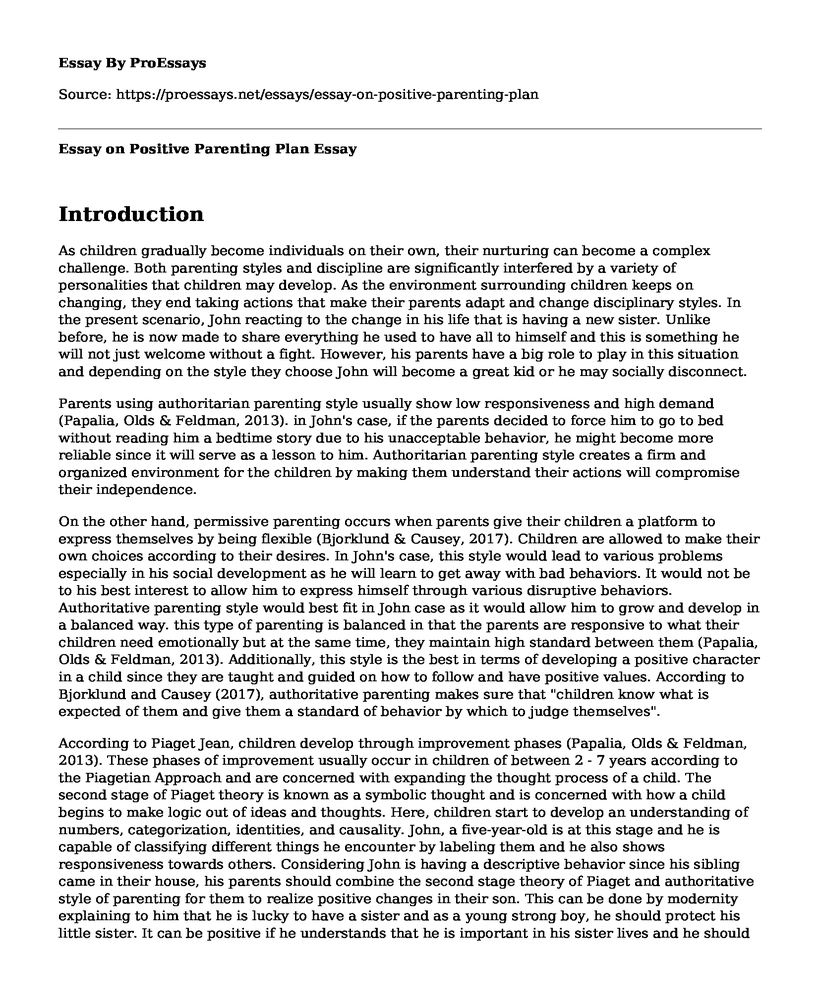Introduction
As children gradually become individuals on their own, their nurturing can become a complex challenge. Both parenting styles and discipline are significantly interfered by a variety of personalities that children may develop. As the environment surrounding children keeps on changing, they end taking actions that make their parents adapt and change disciplinary styles. In the present scenario, John reacting to the change in his life that is having a new sister. Unlike before, he is now made to share everything he used to have all to himself and this is something he will not just welcome without a fight. However, his parents have a big role to play in this situation and depending on the style they choose John will become a great kid or he may socially disconnect.
Parents using authoritarian parenting style usually show low responsiveness and high demand (Papalia, Olds & Feldman, 2013). in John's case, if the parents decided to force him to go to bed without reading him a bedtime story due to his unacceptable behavior, he might become more reliable since it will serve as a lesson to him. Authoritarian parenting style creates a firm and organized environment for the children by making them understand their actions will compromise their independence.
On the other hand, permissive parenting occurs when parents give their children a platform to express themselves by being flexible (Bjorklund & Causey, 2017). Children are allowed to make their own choices according to their desires. In John's case, this style would lead to various problems especially in his social development as he will learn to get away with bad behaviors. It would not be to his best interest to allow him to express himself through various disruptive behaviors. Authoritative parenting style would best fit in John case as it would allow him to grow and develop in a balanced way. this type of parenting is balanced in that the parents are responsive to what their children need emotionally but at the same time, they maintain high standard between them (Papalia, Olds & Feldman, 2013). Additionally, this style is the best in terms of developing a positive character in a child since they are taught and guided on how to follow and have positive values. According to Bjorklund and Causey (2017), authoritative parenting makes sure that "children know what is expected of them and give them a standard of behavior by which to judge themselves".
According to Piaget Jean, children develop through improvement phases (Papalia, Olds & Feldman, 2013). These phases of improvement usually occur in children of between 2 - 7 years according to the Piagetian Approach and are concerned with expanding the thought process of a child. The second stage of Piaget theory is known as a symbolic thought and is concerned with how a child begins to make logic out of ideas and thoughts. Here, children start to develop an understanding of numbers, categorization, identities, and causality. John, a five-year-old is at this stage and he is capable of classifying different things he encounter by labeling them and he also shows responsiveness towards others. Considering John is having a descriptive behavior since his sibling came in their house, his parents should combine the second stage theory of Piaget and authoritative style of parenting for them to realize positive changes in their son. This can be done by modernity explaining to him that he is lucky to have a sister and as a young strong boy, he should protect his little sister. It can be positive if he understands that he is important in his sister lives and he should play the role of a big brother with pride. Additionally, during bedtime, the parents can unite John his sister and request him to read to her since he is the big brother. This will not only promote his social skills but it will also grow a positive relationship between John and the young sister solving the jealousy issue he currently has.
References
Bjorklund, D. F., & Causey, K. B. (2017). Children's thinking: Cognitive development and individual differences. SAGE Publications.
Papalia, D. E., Olds, S. W., & Feldman, R. D. (2013). A child's world: Infancy through adolescence. McGraw-Hill Humanities/Social Sciences/Languages.
Cite this page
Essay on Positive Parenting Plan. (2022, Mar 15). Retrieved from https://proessays.net/essays/essay-on-positive-parenting-plan
If you are the original author of this essay and no longer wish to have it published on the ProEssays website, please click below to request its removal:
- Sociology Essay Example - Gender Stereotypes and Culture
- Essay Sample on Communication Issue in a Workplace
- Types of Communication and Time Management Paper Example
- Essay Example on Female Terrorists: Breaking the Stereotype
- Effective Workplace Communication for Increased Productivity - Essay Sample
- Reaping Benefits: Community Service for Society's Good - Essay Sample
- Paper Example on African Americans' Fight for Equality: A Historical Overview







